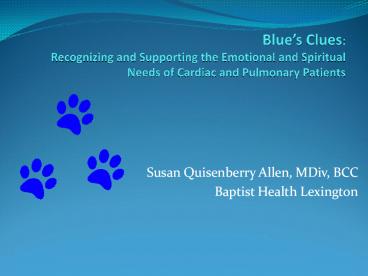Blue PowerPoint PPT Presentation
Title: Blue
1
Blues Clues Recognizing and Supporting the
Emotional and Spiritual Needs of Cardiac and
Pulmonary Patients
- Susan Quisenberry Allen, MDiv, BCC
- Baptist Health Lexington
2
Objectives
- What is the difference between spirituality and
religion? - Emotional and spiritual care enhances
relationships between patients, family members
and staff. - Treating the patient holistically demonstrates
respect for the person and reflects positively
upon the provider. - Providing a support group allows staff to assess
for situational vs. clinical depression. - Offering the patient coping strategies improves
the patients overall outcome.
3
What is Spirituality?
- the way humans seek and experience meaning and
their connectedness to - the moment
- to self, to others, to nature
- and to the significant or sacred
- Improving the Quality of Spiritual Care as a
Dimension of Palliative Care The Report of the
Consensus Conference (Journal of Palliative
Medicine, 2009, 12/10885-904)
4
A Simple Definition of Spirituality
- Spirituality is the relationship
- of trust and safety.
5
Spirituality
- How is it related to being religious?
- Think of someone who you consider to be religious
- Think of someone who you consider to be spiritual
6
Religion and Spirituality
- RELIGION IS FAITH IN BELIEF
7
Religion and Spirituality
- SPIRITUALITY IS FAITH IN RELATIONSHIPS
8
What kind of relationships are we talking about?
- Relationship to God or Higher Power
- Relationship to Others
- Relationship to self
- Relationship to nature or environment
9
Spirituality vs. Religious
- Patients, whether or not they practice any
particular religion, have spiritual needs. We
must be able to assess for these needs if we are
to deliver comprehensive, holistic
care.Richardson Robinson, 2004
10
What does Joint Commission say?
- The Joint Commission on Accreditation of
Healthcare Organizations requires hospitals and
other healthcare institutions to include a
spiritual assessment as part of the overall
assessment of a patient to determine how the
spiritual outlook can affect his or her care,
treatment, and services. - Joint Commission (2005)
11
Joint Commission
- The organization respects and accommodates the
patients right to religious and other spiritual
services. - The organization informs the patient of his/her
rights PRIOR to beginning care, treatment or
services, preferably during the initial
evaluation. - 2009, The Joint Commission, RI.01.01.03, EPs
1-3
12
Connections
- How do you create and maintain connections with
your patients? - How does this relate to spiritual and emotional
care?
13
What gives your life meaning?
14
Meaning of Illness
- Fears concerns intimate strangers
- Illness
- Death dying
- Changes losses
- Family/self/role
- Control
- EPEC Project, Robert Wood Johnson
Foundation, 1999 - Intimate Strangers Journal of Pastoral Care
Vol. XLIV Summer 1990
15
Changes and Losses.
16
Psychological Crisis
- The heart heals faster than the mind because it
has no memory. - (Cardiac Champs a Survivors Guide How to Live
a Healthy, Vigorous, Happy Life After a Heart
Attack, by Larry McConnell, p. 49)
17
Financial Stress
18
Spiritual Crises
- Search for meaning or purpose
- Loss of a sense of connection
- Feelings of guilt or unworthiness
- Questioning of faith
- Desire for forgiveness
- Sense of abandonment by God
- EPEC Project, Robert Wood Johnson
Foundation, 1999
19
Offering Spiritual Care
- Practice of compassionate presence
- Listening to hopes, fears, pain or dreams
- Notice the spiritual journey
- Attentiveness to all dimensions
- Body Mind Spirit
- Incorporate religious practice as appropriate
20
Healing Your Heart
- We discuss the experiences and responses that
people commonly have in dealing with heart
illness and how we can help them move along in
their recovery.
21
Healing Your Heart Topics
- The impact of heart disease on the individual
- Common responses of individuals
- The impact of heart disease on your loved ones
- Coping strategies
- Group discussion
22
What are some of the changes you have
experienced?
23
Types of Responses
- Emotional
- Stages of Grief Shock, Denial, Anger,
Depression, Acceptance
24
Types of Responses
- Blame/Anger
- Directed toward self or others
25
26
Impact on Loved Ones
- Changes in Roles or Reversal of Roles
- Decreased Social Activity
- Financial Concerns
- Fear of losing their loved one
27
Depression
- Is it clinical or situational?
28
Coping Strategies
- A support group
- Exercise
- Healthy Diet Tips
- Spiritual care
- Community
29
- RELATIONSHIPS!
30
Time to Breathe
Ruach (Heb.) and Pneuma (Grk.) A force,
breath, wind, spirit, breath of God
31
For the Spirit of God has made me, and the
breath of the Almighty gives me life. Job
334, (NLT)

